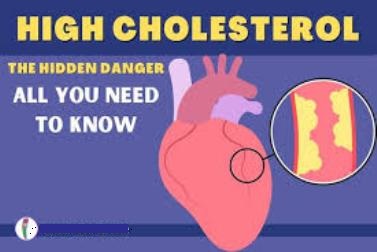
High Cholesterol:
High cholesterol, a common health concern, poses a significant risk to cardiovascular health. Understanding cholesterol, a fatty substance crucial for bodily functions, is key to managing its levels effectively.
Cholesterol exists in two main types: LDL (low-density lipoprotein) and HDL (high-density lipoprotein). While LDL is often termed “bad” cholesterol for its role in plaque formation in arteries, HDL is deemed “good” as it helps remove excess cholesterol.
Several factors contribute to elevated cholesterol, including genetics, diet, and lifestyle choices. Unhealthy diets high in saturated and trans fats can raise LDL levels, emphasizing the importance of a balanced, heart-healthy diet.
Naturopathy offers a holistic approach to manage cholesterol. Incorporating fiber-rich foods, like fruits, vegetables, and whole grains, aids in lowering cholesterol. Additionally, herbal supplements, such as garlic and red yeast rice, are known for their cholesterol-lowering properties.
Ayurveda, an ancient Indian system of medicine, recommends a balanced lifestyle and dietary adjustments. Turmeric, a powerful anti-inflammatory spice, is believed to have cholesterol-lowering effects. Yoga and meditation, integral to Ayurveda, can also contribute to overall cardiovascular health.
Diet therapy plays a crucial role in cholesterol management. Opting for a Mediterranean-style diet, rich in olive oil, nuts, and fatty fish, has proven effective in reducing LDL levels. Limiting processed foods, sugary beverages, and red meat further supports a heart-healthy lifestyle.
Exercise is a potent tool in cholesterol management. Regular physical activity raises HDL levels and helps control weight, reducing the risk of elevated cholesterol. A combination of aerobic exercises and strength training can be tailored to individual fitness levels.
Medical intervention may be necessary for those with persistently high cholesterol. Statin medications are commonly prescribed to lower LDL levels and reduce cardiovascular risk. However, lifestyle modifications should always complement pharmacological approaches.
Regular cholesterol screenings are essential for early detection and intervention. Awareness of cholesterol levels empowers individuals to make informed decisions about their health. Collaborating with healthcare professionals ensures personalized guidance and effective cholesterol management strategies.
In conclusion, addressing high cholesterol requires a multifaceted approach encompassing naturopathy, Ayurveda, diet therapy, and, when necessary, medical intervention. Empowering individuals with knowledge and promoting proactive lifestyle changes are integral to the quest for optimal cardiovascular health. For more details, visit or call at Yuvaan Naturopathy and Ayurved Center in Indirapuram, Ghaziabad.




Be the first to comment